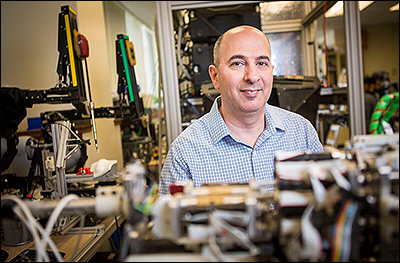Mechanical Engineering Professor Nabil Simaan was named a co-editor of a special issue on surgical robotics for Proceedings of the IEEE. The July 2022 special issue, “Surgical Robotics and Computer-Integrated Interventional Medicine,” provides a research overview of the major applications and enabling technologies in the growing field of surgical robotics.

In the 15 years since Proceedings of the IEEE devoted a special issue to the subject of medical and health robots, active research into—and clinical applications of—the technology has grown significantly.
“The integration of robotics and computer technology into health care is an area of tremendous ongoing innovation. This field continues to grow exponentially and across multiple dimensions,” Simaan said. “I’m pleased to work on this special issue of Proceedings to offer researchers across the globe a snapshot into where this technology stands today—and to provide a glimpse of where it’s headed in the future.”
The issue contains an overview of emerging clinical applications and consideration of topics such as safety, sterility, and operating room compatibility. It also lays out a roadmap of trends in technology and control paradigms for these systems.
The authors also engage in a broader discussion of how surgical robots and interventional systems fit into the larger picture of the complete cycle of medical care, from diagnosis and treatment to recovery, rehabilitation, and home care. Simaan co-authored an article in the issue focused on surgical continuum robotics, which are designed to reach confined or complex areas.
Simaan’s research interests include medical robotics, kinematics, robot modeling and control, and human-robot interaction. He is a faculty member in the Vanderbilt Institute of Surgery and Engineering and director of the Advanced Robotics and Mechanism Applications Laboratory at Vanderbilt. Simaan is a fellow of IEEE and the American Society of Mechanical Engineers.
The other co-editors include Russell H. Taylor, John C. Malone Professor of computer science at Johns Hopkins University, director of the Laboratory for Computational Sensing and Robotics, and National Academy of Engineering member; Arianna Menciassi, professor of biomedical robotics at Scuola Superiore Sant’Anna, Italy, and the team leader of the Surgical Robotics and Allied Technologies area at The BioRobotics Institute, Pontedera, Italy; and Guang-Zhong Yang, the founding dean of the Medical Robotics Institute, Shanghai Jiao Tong University, China, and he was the founding director of the Hamlyn Centre for Robotic Surgery, Imperial College London.
Contact: Brenda Ellis, 615 343-6314
brenda.ellis@vanderbilt.edu